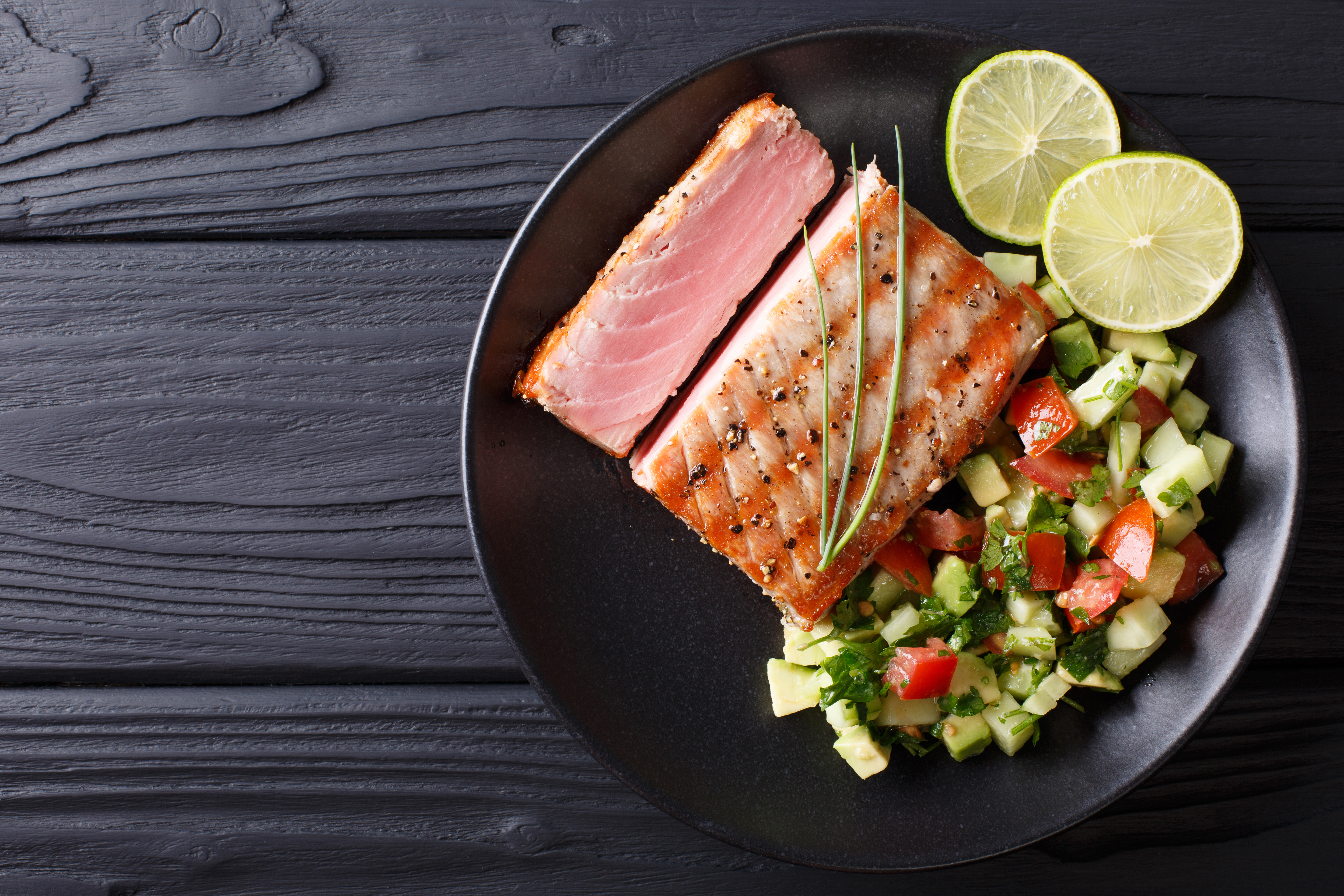This content has been archived. It may no longer be relevant
 Fish is a traditional grilled ingredient, thanks to its wide availability around the world.
Fish is a traditional grilled ingredient, thanks to its wide availability around the world.
Even if you live miles from a fishing spot, you can guarantee that you’ll find fresh frozen fish in your local supermarket or specialty grocer.
So Is Grilled Fish Healthy? The simple answer is yes and it’s very nutritional.
Fish might not be your first choice for a summer barbecue, but when you learn about its health benefits, you’ll soon add it to your favorites list.
Grilling is one of the healthiest ways to cook fish. Let’s take a look at the reasons why.
What Makes Fish a Healthy Grilling Alternative?

Fish can be a healthy grilling alternative due to its low calorie content, high levels of Omega-3 fatty acids, lean protein, low saturated fat, essential nutrients, and versatility in flavors and species.
Grilling fish can help retain its natural goodness while adding a delicious smoky flavor.
However, it’s important to consider the type of fish, cooking method, and ingredients used to ensure a healthy grilled fish dish.
Let’s explore the health benefits of grilling fish in more detail.
- Low in calories. Fish is generally low in calories compared to other meats, making it a good option for those watching their calorie intake. Grilling fish can help retain its natural flavors without adding excessive calories from oil or other fats.
- High in Omega-3 fatty acids. Fish, especially fatty fish like salmon, mackerel, and trout, are rich in Omega-3 fatty acids, which are essential fats that have been shown to promote heart health, reduce inflammation, and support brain health. Grilling fish can help preserve the Omega-3 content as long as it’s not overcooked.
- Lean protein source. Fish is a great source of lean protein, which is important for muscle building, weight management, and overall health. Grilling fish can help retain its protein content while adding a delicious smoky flavor.
- Low in saturated fat. Fish is generally low in saturated fat, which is the unhealthy fat that can increase cholesterol levels and contribute to heart disease. Grilling fish without adding extra fats can help keep its saturated fat content low, making it a healthier grilling option compared to some other meats.
- Rich in essential nutrients. Fish is packed with essential nutrients such as vitamins D and B12, selenium, and phosphorus, which are important for various bodily functions including bone health, immune function, and nerve function. Grilling fish can help preserve these nutrients, making it a nutritious choice for a healthy diet.
- Versatile and flavorful. Fish comes in a wide variety of species and flavors, allowing for endless possibilities when it comes to grilling. From mild white fish to rich and flavorful salmon, you can experiment with different types of fish and seasonings to create delicious and healthy grilled fish dishes.
However, it’s important to note that the healthiness of grilled fish also depends on the type of fish, the cooking method, and the ingredients used.
To make sure you’re making a healthy choice, opt for fresh, high-quality fish, use minimal added fats, and avoid high-calorie marinades or sauces.
Grilling fish can be a healthy and delicious option for your diet, but always consider your individual dietary needs and consult with a healthcare professional if you have any specific health concerns.
How to Bring Out The Best Flavor in Grilled Fish
 Grilling fish can be a delicious and healthy way to prepare this nutritious protein source.
Grilling fish can be a delicious and healthy way to prepare this nutritious protein source.
Here are some tips to bring out the best flavor in grilled fish.
- Start with fresh fish. Using fresh, high-quality fish is key to achieving the best flavor. Look for fish that has a bright color, clear eyes, and a fresh, mild odor. Avoid fish that smells fishy or has discolored flesh, as it may be less flavorful.
- Marinate the fish. Marinating fish before grilling can infuse it with flavor and help keep it moist. You can use a simple marinade made with ingredients like olive oil, lemon juice, herbs, and spices. Let the fish marinate in the refrigerator for at least 30 minutes, or even overnight for more intense flavors.
- Don’t overcook. Overcooking fish can result in dry and bland-tasting fish. Fish cooks quickly on the grill, so be sure to monitor it closely and avoid leaving it on for too long. Fish is done when it flakes easily with a fork and is opaque in the center. Cooking times vary depending on the thickness of the fish, so adjust accordingly.
- Use a clean and well-oiled grill. Make sure your grill grates are clean and well-oiled to prevent the fish from sticking. Preheat the grill to medium-high heat before adding the fish. You can also oil the fish itself to help prevent it from sticking to the grill.
- Enhance with herbs, spices, and citrus. Herbs, spices, and citrus can add a burst of flavor to grilled fish. Try seasoning your fish with herbs like dill, parsley, or cilantro, and spices like paprika, cumin, or garlic powder. Squeezing fresh lemon, lime, or orange juice over the fish before or after grilling can also add a tangy flavor.
- Experiment with wood chips or planks. Using wood chips or planks on the grill can add a smoky flavor to the fish. Soak wood chips in water for about 30 minutes before placing them directly on the coals or on a smoker box for a gas grill. If using wood planks, soak them in water for at least 2 hours, then place the fish on top of the plank and grill for added smokiness.
- Keep it simple. Sometimes, less is more. Fish has a delicate flavor that can be easily overwhelmed, so keeping it simple with minimal seasoning and letting the natural flavors of the fish shine through can be a great approach.
By following these tips, you can bring out the best flavor in grilled fish and create a delicious and memorable meal that will be enjoyed by all.
What are the Healthiest Fish to Grill?

There are several types of fish that are considered healthy options for grilling due to their high nutritional content and sustainability.
Here are some examples of healthy fish to grill.
- Salmon. Salmon is a fatty fish that is rich in heart-healthy Omega-3 fatty acids, high-quality protein, and vitamin D. It has a rich, flavorful flesh that grills well, and its high fat content helps keep it moist during cooking.
- Trout. Trout is another fatty fish that is similar to salmon in terms of its nutritional profile. It’s a good source of Omega-3 fatty acids, protein, and vitamin D. Trout has a delicate, mild flavor that is enhanced when grilled, making it a tasty and healthy option.
- Tuna.Tuna is a lean fish that is high in protein, low in fat, and a good source of Omega-3 fatty acids. It has a firm texture and a rich, meaty flavor that holds up well on the grill. Tuna steaks are often grilled and can be seasoned with herbs, spices, and marinades to enhance their flavor. However, it’s important to choose sustainably sourced tuna, such as pole-caught or line-caught tuna, to ensure that it is harvested in an environmentally responsible manner.
- Sardines. Sardines are small, oily fish that are packed with Omega-3 fatty acids, protein, and calcium. They have a bold, distinct flavor that holds up well to grilling, and their small size makes them convenient for grilling whole or in a foil packet.
- Mackerel. Mackerel is a fatty fish that is high in Omega-3 fatty acids, protein, and vitamin B12. It has a robust flavor that grills well and can be used in a variety of grilled fish dishes.
- Rainbow trout. Rainbow trout is a freshwater fish that is known for its delicate flavor and tender texture. It’s a good source of Omega-3 fatty acids, protein, and vitamin D, and can be a healthy option for grilling.
- Black cod. Black cod, also known as sablefish, is a rich and flavorful fish that is high in Omega-3 fatty acids, protein, and vitamin D. It has a buttery texture that is well-suited for grilling, and its high oil content helps keep it moist.
- Halibut. Halibut is a lean fish that is low in fat but high in protein, potassium, and vitamin B12. It has a mild, slightly sweet flavor that grills well and is often used in grilled fish recipes.
When choosing fish for grilling, it’s important to look for sustainably sourced options that are harvested using environmentally responsible practices to help protect fish populations and marine ecosystems.
Additionally, be sure to follow proper food safety guidelines, such as handling and cooking fish to the appropriate temperature, to ensure safe consumption.
Is Grilled Fish Good for Weight Loss?
 Grilled fish can be a healthy option for a meal.
Grilled fish can be a healthy option for a meal.
Fish is a good source of lean protein, omega-3 fatty acids, and other essential nutrients.
Grilling fish can be a healthier cooking method compared to frying or sautéing, as it requires little to no added oil or fat.
Grilling can also help retain the natural flavors and moisture of the fish, resulting in a delicious and nutritious meal.
However, it’s important to keep in mind that the overall healthiness of grilled fish depends on various factors such as the type of fish, marinades or sauces used, and portion sizes.
Opt for fatty fish like salmon, mackerel, or trout that are rich in omega-3 fatty acids, which are known for their heart-healthy benefits.
Avoid using excessive amounts of oil, butter, or high-calorie sauces, as they can add unnecessary calories and fat to the dish.
Additionally, it’s essential to practice safe grilling practices, such as properly cleaning and oiling the grill grates, avoiding charring or overcooking the fish to prevent the formation of harmful compounds, and ensuring the fish reaches the recommended internal temperature for safe consumption.
Overall, grilled fish can be a healthy and delicious option for a meal when prepared with care and attention to portion sizes and ingredients.
Incorporate grilled fish into a well-balanced diet for a nutritious and enjoyable dining experience.
Bottom Line – Is Grilled Fish Healthy?

Grilled fish can be a healthy option for a meal.
Fish is a good source of lean protein, omega-3 fatty acids, and other essential nutrients.
Grilling fish can be a healthier cooking method compared to frying or sautéing, as it requires little to no added oil or fat.
Grilling can also help retain the natural flavors and moisture of the fish, resulting in a delicious and nutritious meal.
However, it’s important to keep in mind that the overall healthiness of grilled fish depends on various factors such as the type of fish, marinades or sauces used, and portion sizes.
Opt for fatty fish like salmon, mackerel, or trout that are rich in omega-3 fatty acids, which are known for their heart-healthy benefits.
Avoid using excessive amounts of oil, butter, or high-calorie sauces, as they can add unnecessary calories and fat to the dish.
Additionally, it’s essential to practice safe grilling practices, such as properly cleaning and oiling the grill grates, avoiding charring or overcooking the fish to prevent the formation of harmful compounds, and ensuring the fish reaches the recommended internal temperature for safe consumption.
Overall, grilled fish can be a healthy and delicious option for a meal when prepared with care and attention to portion sizes and ingredients.
Incorporate grilled fish into a well-balanced diet for a nutritious and enjoyable dining experience.

